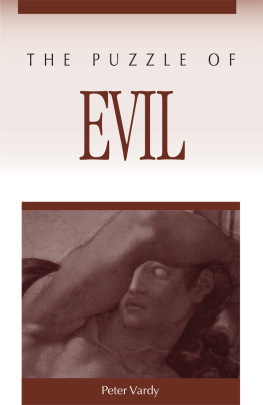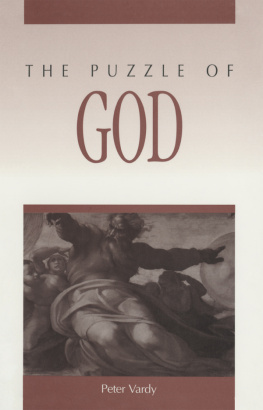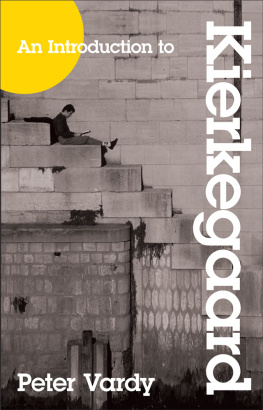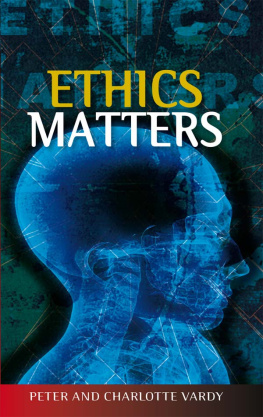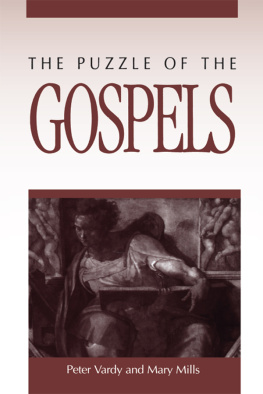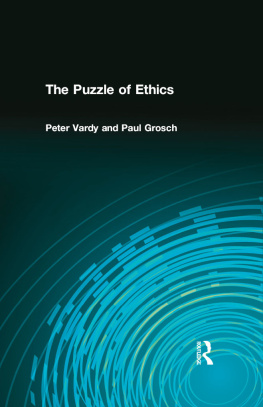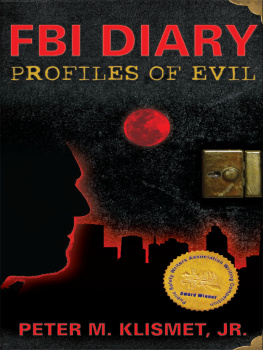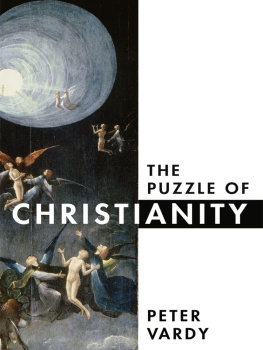THE PUZZLE OF EVIL
Books by Peter Vardy
available from M.E. Sharpe
THE PUZZLE OF ETHICS
(with Paul Grosch)
THE PUZZLE OF GOD
THE PUZZLE OF THE GOSPELS
(with Mary Mills)
The Puzzle of Evil
PETER VARDY
First published 1992 by M.E. Sharpe
Published 2015 by Routledge
2 Park Square, Milton Park, Abingdon, Oxon OX14 4RN
711 Third Avenue, New York, NY 10017, USA
Routledge is an imprint of the Taylor & Francis Group, an informa business
Copyright 1992 Taylor & Francis. All rights reserved.
No part of this book may be reprinted or reproduced or utilised in any form or by any electronic, mechanical, or other means, now known or hereafter invented, including photocopying and recording, or in any information storage or retrieval system, without permission in writing from the publishers.
Notices
No responsibility is assumed by the publisher for any injury and/or damage to persons or property as a matter of products liability, negligence or otherwise, or from any use of operation of any methods, products, instructions or ideas contained in the material herein.
Practitioners and researchers must always rely on their own experience and knowledge in evaluating and using any information, methods, compounds, or experiments described herein. In using such information or methods they should be mindful of their own safety and the safety of others, including parties for whom they have a professional responsibility.
Product or corporate names may be trademarks or registered trademarks, and are used only for identification and explanation without intent to infringe.
Library of Congress Cataloging-in-Publication Data
Vardy, Peter.
The puzzle of evil / Peter Vardy.
p. cm.
Originally published: London: Fount, 1992.
ISBN 0-7656-0167-2 (hardcover: alk. paper).
ISBN 0-7656-0168-0 (pbk.: alk. paper)
1. Good and evil. 2. Theodicy. I. Title.
BJ1401.V37 1997
214dc21 97-2910
CIP
ISBN 13: 9780765601681 (pbk)
ISBN 13: 9780765601674 (hbk)
TO MY FAMILY
My wife Anne and our children
Catherine, Christian, Leah, Luke and Kirsten.
With my thanks for
their patience and love.
CONTENTS
Dear Reader,
Come with me on a quest, an adventure. Like any quest it involves a search but in this case our quest is for unseen realities. We will probe the existence and nature of those dark and evil forces that seem to torment human beings and will try, as we go, to understand how it can possibly be that these fearsome forces exist in a world which many hold has been created by a wholly good and all-powerful God. This is no search for fairies, no hunt for a snark, no myth to entertain during idle hours, but a search for truth and understanding about the ultimate nature of evil.
We all have to die, we all have to face mental and physical pain, yet most of us know that the suffering of others is far worse than anything we shall ever experience. Our television screens make us recoil in horror from pictures of the death camps, of people starving to death in Africa or children who have been beaten and abused by their own parents. How can we make sense of it all? This book is intended to help you to answer this question for yourself. It is in two parts the first covers reasonably well-trodden ground and takes up about a third of the book. It explains how thinkers before us have tackled these issues and what the strengths and weaknesses of their approaches are. In the second part, I try to find a new path, a new way of understanding the old problems, and invite you to accompany me-on the journey.
Many people have helped me directly and indirectly in writing this book. My postgraduate and undergraduate students at Heythrop College, University of London, where I lecture in philosophy of religion have made a real contribution to the first part with their enthusiasm and questions as we probed these issues together. In particular I would record my thanks to Vic Coughtrey and Rory Fox. Others, however, have helped me by the example of their own journeys and their friendship. I am particularly grateful to Sr Carmelina, a now retired Dominican Sister in South Africa, who taught my wife when she was at school; to Sr Anne-Marie Quigg who by her friendship as well as her work and example in Africa have helped me understand a great deal; to Fr Michael Ruddy of Ireland for his honesty and openness; to the Revd Gordon Dowden who has devoted his life to the people of inner-city Manchester; to the Revd Robert Corbin, the former vicar of Selborne in Hampshire where I lived for ten happy years; to George Wilde S.J. of Heythrop College who died in the week this book went to the printers and whose gentleness and faith I will long remember; and to the Revd Nigel Mead of Shebbear in Devon whose kindness and patient example have been an inspiration. Above all my thanks are due to Anne, my wife of eighteen very happy years, for her constant love and support.
| PETER VARDY |
| Heythrop College | St Clair |
| University of London | Devon, England |
| Pentecost 1991 to Epiphany 1992 |
Is God willing to prevent evil, but not able? Then he is impotent. Is he able but not willing? Then he is malevolent. Is he both able and willing? Whence then is evil?
EPICURUS
Why is there any misery in the world? Not by chance, surely. From some cause then. Is it then from the intention of the deity? But he is perfectly benevolent. Is it contrary to his intention? But he is almighty. Nothing can shake the solidity of this reasoning. So short, so clear, so decisive
DAVID HUME, Dialogues concerning Natural Religion, Penguin, pp.11112
Try to think of someone who is really evil. Many people would immediately pick on Hitler yet even Hitler had many good points. Hitlers leadership and his party transformed a war-torn and ravaged Germany, which had been bled dry by the Allied powers after the First World War, into a modern and prosperous nation. Hitler loved children and was faithful to his friends. Of course, the slaughter of the Jews, gypsies, Poles and others as well as the expansionist policies which led to the Second World War were malevolently evil, but the issue is more complicated than may at first appear. The Spanish dictator Franco was vilified by most of the Western and Eastern world, but his officials saved more Jews in the Second World War than did the French government under Ptain and he brought constitutional democracy and stability back to Spain. England celebrates the killing of Guy Fawkes, yet he was trying to get rid of a perverted king and a parliament that was hopelessly intolerant. Does that make him a terrorist fiend or simply part of the leadership of a strong opposition driven to take extreme measures to defend liberty? Oliver Cromwell, who brought democracy to England, was in many ways an ill-mannered murderer, and General Shermans treatment of the State of Georgia in the Civil War was unforgiveable in its ferocity. Almost always black is mixed with white, or at the least grey.
What is evil? It is too easy to think that suffering and evil are the same, but are they? An inoculation may be painful, but it is good for you. An operation may cure a disease or a defect in ones body, even though pain and inconvenience may be the short-term result. Some human suffering can ennoble the individual, although it must be recognized that it can destroy as well. One needs to relate the eventual good to the assumed evil.


